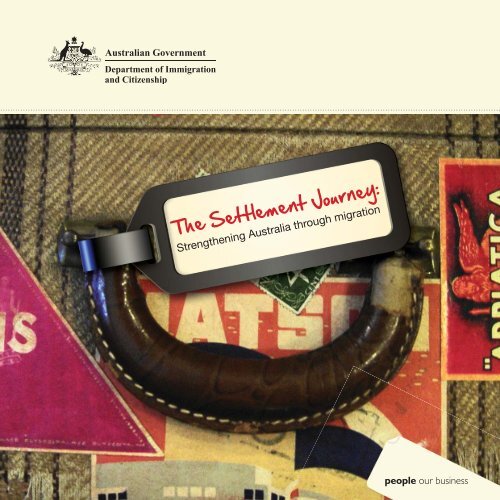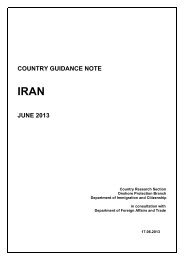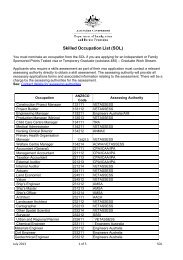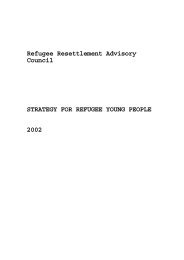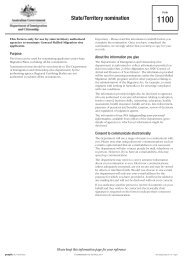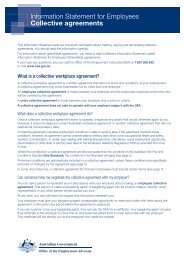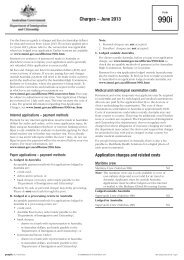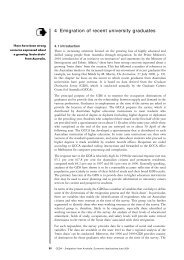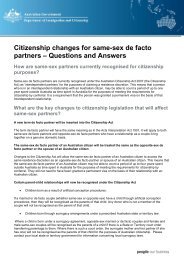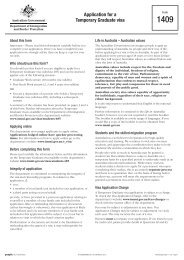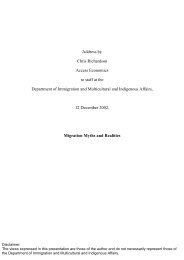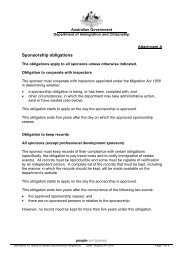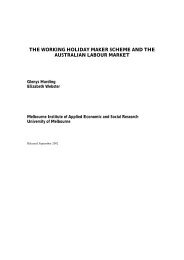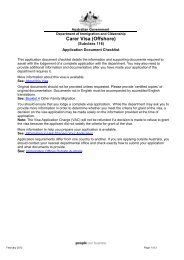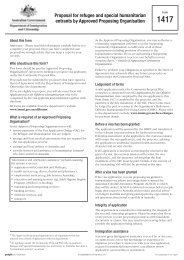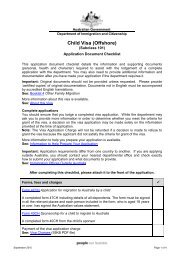The Settlement Journey - Strengthening Australia through migration
The Settlement Journey - Strengthening Australia through migration
The Settlement Journey - Strengthening Australia through migration
You also want an ePaper? Increase the reach of your titles
YUMPU automatically turns print PDFs into web optimized ePapers that Google loves.
<strong>The</strong> <strong>Settlement</strong> <strong>Journey</strong>:<br />
<strong>Strengthening</strong> <strong>Australia</strong> <strong>through</strong><br />
<strong>migration</strong>
<strong>The</strong> <strong>Settlement</strong> <strong>Journey</strong>:<br />
<strong>Strengthening</strong> <strong>Australia</strong> <strong>through</strong> <strong>migration</strong>
© Commonwealth of <strong>Australia</strong> 2012<br />
All material presented in this publication is provided under a Creative Commons Attribution 3.0 <strong>Australia</strong> licence<br />
(http://creativecommons.org/licenses/by/3.0/au/deed.en).<br />
For the avoidance of doubt, this means this licence only applies to material as set out in this document, with the exception of<br />
the following:<br />
• photographs and images; and<br />
• graphic designs.<br />
<strong>The</strong> details of the relevant licence conditions are available on the Creative Commons website (accessible using the links<br />
provided) as is the full legal code for the CC BY 3.0 AU licence<br />
(http://creativecommons.org/licenses/by/3.0/legalcode).<br />
Use of the Coat of Arms<br />
<strong>The</strong> terms under which the Coat of Arms can be used are detailed on the It’s an Honour website<br />
(http://www.itsanhonour.gov.au/coat-arms/index.cfm).<br />
Contact us<br />
Enquiries regarding the licence and any use of this document are welcome at:<br />
National Communications Branch<br />
Department of Im<strong>migration</strong> and Citizenship<br />
PO Box 25<br />
BELCONNEN ACT 2616<br />
Telephone: 02 6264 2233<br />
Email: comms@immi.gov.au<br />
ISBN: 978-1-921662-10-2.<br />
Contents<br />
Message from Senator the Hon Kate Lundy 1<br />
Introduction 2<br />
<strong>The</strong> <strong>Australia</strong>n Government’s settlement policy 3<br />
<strong>Settlement</strong> services benefit all <strong>Australia</strong>ns 3<br />
<strong>The</strong> settlement journey 4<br />
<strong>Australia</strong>’s settlement services are targeted to<br />
meet the needs of new arrivals<br />
Hawo Ali’s settlement journey 8<br />
What makes successful settlement? 12<br />
Conceptual framework for understanding settlement outcomes 13<br />
Working together to improve settlement outcomes 14<br />
Dipika Mistry’s settlement journey 16<br />
Key principles 20<br />
How are we tracking? 22<br />
6
Message from Senator the Hon Kate Lundy<br />
Minister for Multicultural Affairs, Minister for Sport and<br />
Minister Assisting for Industry and Innovation<br />
I welcome the opportunity to present the <strong>Australia</strong>n Government’s settlement policy,<br />
<strong>The</strong> <strong>Settlement</strong> <strong>Journey</strong>: <strong>Strengthening</strong> <strong>Australia</strong> <strong>through</strong> <strong>migration</strong>.<br />
<strong>Australia</strong> is a nation built on im<strong>migration</strong> and shaped by the settlement experience.<br />
Since 1945, more than seven million people have migrated to <strong>Australia</strong> to help form<br />
one of the most linguistically, culturally and religiously diverse nations on earth.<br />
With more than a quarter of the current population born overseas, the process of<br />
building a new life in a foreign country is a lived experience for many of us.<br />
<strong>The</strong> amazing breadth and diversity of <strong>Australia</strong>n society and our country’s commitment to multiculturalism is testament<br />
to the centrality of settlement to our nation’s story.<br />
<strong>Australia</strong> is a world leader in the provision of settlement services. This policy recognises the important support that<br />
settlement services provide to newly arrived migrants and refugees as they adjust to a new life in <strong>Australia</strong> and start<br />
making valuable contributions to <strong>Australia</strong>’s ongoing economic, social and cultural development. <strong>The</strong> inspiring stories<br />
of Hawo Ali and Dipika Mistry in this booklet demonstrate how settlement services help new arrivals enrich our country.<br />
<strong>Australia</strong>’s settlement policy is an important element of the government’s vision of a socially inclusive society in which all<br />
<strong>Australia</strong>ns are valued and have the opportunity to participate fully.<br />
It also commits the government to new ways of working in partnership with the settlement sector based on mutual trust,<br />
respect and collaboration. This commitment is enshrined in the National Compact between the government and the<br />
not-for-profit sector which forms a key part of the social inclusion agenda.<br />
We are in a challenging period of change. <strong>The</strong> increased provision of services by the settlement sector to asylum seekers will<br />
influence this settlement policy over time, and will be fully considered in the review of the Strategic <strong>Settlement</strong> Framework<br />
in 2015.<br />
I commend this booklet to you. It demonstrates how our settlement policy benefits new migrants and builds a strong<br />
<strong>Australia</strong> <strong>through</strong> <strong>migration</strong>.<br />
Kate Lundy<br />
<strong>The</strong> <strong>Settlement</strong> <strong>Journey</strong>: <strong>Strengthening</strong> <strong>Australia</strong> <strong>through</strong> <strong>migration</strong> 1
2<br />
Introduction<br />
In September 2009, the <strong>Australia</strong>n Government announced the Strategic <strong>Settlement</strong> Framework, which set out new directions<br />
for the reform and strengthening of <strong>Australia</strong>’s settlement services. <strong>The</strong>se new directions followed national consultations<br />
in relation to key settlement programs in 2008 and 2009. Consultations were conducted with community organisations,<br />
government agencies and other interested stakeholders. Focus groups were also held with former migrants and humanitarian<br />
entrants to seek feedback on their needs and ideas to better support their successful settlement.<br />
<strong>The</strong> framework set out the following priorities for reform:<br />
• greater emphasis on individual needs<br />
• greater focus on the needs of youth<br />
• greater focus on whole-of-government strategies<br />
• a more structured approach to orientation<br />
• more flexibility in program delivery and funding to support innovation and partnerships<br />
• more opportunities to support sustainable regional settlement<br />
• an evidence based approach to policy and program development<br />
Since 2009, the government has substantially reformed many of <strong>Australia</strong>’s settlement programs in line with these key themes.<br />
<strong>The</strong> reforms were implemented in the first half of 2011, and included a major redesign of humanitarian settlement services and<br />
the Adult Migrant English Program to better align these critical programs with the needs of migrants and humanitarian entrants.<br />
<strong>The</strong> government’s reform agenda continues in 2012 with the implementation of substantial changes to the <strong>Settlement</strong> Grants<br />
Program, the roll-out of a range of initiatives to better support migrant and humanitarian youth and the signing of new contracts<br />
for the Complex Case Support Program.<br />
<strong>The</strong> government’s social inclusion agenda has also been a key driver for change, influencing both the design and delivery of<br />
settlement programs.<br />
<strong>The</strong>se reforms underscore the government’s commitment to finding new and innovative ways to improve the settlement<br />
outcomes of migrants and humanitarian entrants.<br />
<strong>The</strong> <strong>Australia</strong>n Government’s settlement policy<br />
<strong>The</strong> <strong>Australia</strong>n Government’s settlement policy supports the economic, social and<br />
humanitarian benefits of <strong>migration</strong>.<br />
This involves:<br />
• addressing the needs of new arrivals to help them develop the knowledge<br />
and skills they need to become active and independent participants in<br />
<strong>Australia</strong>n society<br />
• governments and society being responsive to the cultural, linguistic and religious<br />
diversity of migrants.<br />
<strong>Settlement</strong> services benefit all <strong>Australia</strong>ns<br />
Migrants and humanitarian entrants enrich the fabric of our nation and help build<br />
a stronger <strong>Australia</strong>.<br />
Through participation in the educational and economic life of <strong>Australia</strong>,<br />
migrants and humanitarian entrants contribute their ingenuity, hard work and<br />
determination to improve their own lives. In doing so, they help to enhance<br />
<strong>Australia</strong>’s ongoing economic strength and diversity. Migrants and humanitarian<br />
entrants facilitate trade and investment between <strong>Australia</strong> and their countries of<br />
origin. <strong>The</strong> Migrant and Economic Outcomes and Contributions report of April<br />
2011 estimates that the 2009–10 Permanent Migration Program will contribute<br />
$1.2 billion over ten years to the <strong>Australia</strong>n economy.<br />
Through participation in the social life of <strong>Australia</strong>, migrants and humanitarian<br />
entrants contribute their knowledge, skills and time. <strong>The</strong>y have a high level of volunteering and a<br />
genuine desire to give back to the <strong>Australia</strong>n community. <strong>The</strong>ir enormous contributions to other new arrivals and the broader<br />
community were recognised in research recently undertaken by the government.<br />
Through participation in the cultural life of <strong>Australia</strong>, migrants and humanitarian entrants add their cultural, religious and<br />
linguistic diversity to the dynamic face of our nation. <strong>The</strong>ir contributions to sport, art, cuisine, and cultural festivals add new and<br />
exciting layers to the fabric of our nation.<br />
<strong>The</strong> <strong>Settlement</strong> <strong>Journey</strong>: <strong>Strengthening</strong> <strong>Australia</strong> <strong>through</strong> <strong>migration</strong> 3
4<br />
<strong>The</strong> settlement journey<br />
Migrants are drawn to <strong>Australia</strong> by the economic and lifestyle opportunities available here,<br />
while humanitarian entrants come for protection from conflict situations. All want to make<br />
a better life for themselves in this country. Many say they love living in <strong>Australia</strong> because<br />
they are safe, free from discrimination, and able to contribute to our society no matter<br />
who they are and where they came from.<br />
<strong>The</strong> settlement journey begins when migrants and humanitarian entrants access<br />
pre-embarkation information about <strong>Australia</strong>, either online or <strong>through</strong> a specialised<br />
training program.<br />
After arrival, settlement services focus on enabling self reliance, developing their English<br />
language skills, and connecting with mainstream services and the broader <strong>Australia</strong>n<br />
society. While the length of time that new arrivals take to feel settled varies, settlement<br />
services give them the best start to life in their new country. <strong>The</strong> settlement journey may<br />
involve seeking and maintaining employment, pursuing further education or working as<br />
a volunteer.<br />
<strong>The</strong> People of <strong>Australia</strong>: <strong>Australia</strong>’s Multicultural Policy and the Access and Equity Strategy<br />
and Framework promote equitable participation in our society. <strong>The</strong>se policies recognise<br />
that our cultural diversity is at the heart of our national identity and all <strong>Australia</strong>ns should<br />
be able to access government programs and services, regardless of their cultural, linguistic<br />
or religious backgrounds. A unique feature of <strong>Australia</strong>’s multicultural policy is that those<br />
who choose to call <strong>Australia</strong> home have the right to practice and share their cultural<br />
traditions and languages within the law and free from discrimination. <strong>The</strong> National Anti-<br />
Racism Strategy reinforces this policy by working to prevent and reduce racism in <strong>Australia</strong>.<br />
Retaining cultural identity during a period of significant adjustment provides an anchor for<br />
new settlers, a bridge between the old and the new.<br />
Becoming an <strong>Australia</strong>n citizen plays an important role in making migrants feel they<br />
belong to our nation. It is a significant milestone on the settlement journey, and has deep<br />
significance for many migrants and humanitarian entrants. In becoming citizens, migrants pledge their loyalty to <strong>Australia</strong> and<br />
its people, give a commitment to uphold our laws, and respect our democratic rights and responsibilities. <strong>Australia</strong>n citizenship<br />
marks the beginning of their formal membership of the <strong>Australia</strong>n community.<br />
<strong>The</strong> settlement journey—from <strong>migration</strong> to settlement<br />
On-shore Off-shore<br />
Pre-settlement<br />
community services<br />
Pre-embarkation settlement<br />
information<br />
Humanitarian Entrants Migrants<br />
Community Detention support <strong>Australia</strong>n Cultural Internet<br />
for asylum seekers Orientation Program Employers<br />
Family<br />
Specialised Humanitarian Services<br />
Humanitarian <strong>Settlement</strong> Service<br />
Complex Case Support<br />
Support for Unaccompanied<br />
Humanitarian Minors<br />
General <strong>Settlement</strong> Services<br />
Adult Migrant English Program<br />
<strong>Settlement</strong> Grants Program<br />
Translating and Interpreting Service<br />
Equitable Participation in Multicultural <strong>Australia</strong><br />
<strong>Australia</strong>’s Multicultural Policy<br />
Access and Equity Strategy<br />
Diversity and Social Cohesion Program<br />
<strong>Australia</strong>n<br />
Settled Citizenship<br />
Social participation<br />
Economic wellbeing<br />
Independence<br />
Personal wellbeing<br />
Life satisfaction and community connectedness<br />
<strong>The</strong> <strong>Settlement</strong> <strong>Journey</strong>: <strong>Strengthening</strong> <strong>Australia</strong> <strong>through</strong> <strong>migration</strong> 5
6<br />
<strong>Australia</strong>’s settlement services are targeted to<br />
meet the needs of new arrivals<br />
<strong>Settlement</strong> services are designed to assist eligible migrants<br />
and humanitarian entrants in the first five years of arrival in<br />
<strong>Australia</strong>. <strong>The</strong>se services are designed to complement, not<br />
replace, the services available to all <strong>Australia</strong>ns.<br />
<strong>The</strong> amount of settlement support provided by the <strong>Australia</strong>n<br />
Government is based on need. Those arriving as skilled<br />
migrants are expected to settle in <strong>Australia</strong> with limited help.<br />
Family migrants (spouses, children and parents of <strong>Australia</strong>n<br />
residents) and family members of skilled migrants who speak<br />
little or no English, are able to get help to learn English and<br />
access some settlement support services.<br />
<strong>The</strong> most intensive assistance is provided to<br />
humanitarian entrants in recognition of their greater<br />
needs, in alignment with United Nations High<br />
Commissioner for Refugees principles and best practice.<br />
Many have escaped from life threatening situations<br />
and war torn societies, become separated from their<br />
immediate family, lost their homes and possessions<br />
and lived for many years in refugee camps. <strong>The</strong>y<br />
may face multiple disadvantages because of their<br />
experiences, including mental health issues, physical<br />
disabilities, illiteracy, poor English language skills,<br />
disrupted schooling, and limited opportunities to gain<br />
skills, qualifications and work experience. Despite this,<br />
humanitarian entrants are resilient and enthusiastic<br />
about making a contribution to <strong>Australia</strong>n society, and<br />
the support they receive helps them to get started.<br />
<strong>The</strong> <strong>Australia</strong>n Government works with settlement service<br />
providers in a partnership based on cooperation and mutual<br />
respect. <strong>Settlement</strong> services are delivered by community<br />
based organisations which have strong links with migrants<br />
and humanitarian entrants and their communities. Community<br />
detention and bridging visa arrangements provide<br />
opportunities for asylum seekers to establish links in the<br />
community. For example, attending school or a cultural group<br />
can speed up the pathway to successful settlement if a<br />
permanent visa is granted.<br />
<strong>The</strong> close collaboration between community detention<br />
service providers and settlement service providers ensures<br />
the smooth transition of asylum seekers from community<br />
detention into the community. This includes support with<br />
locating housing, income support arrangements and<br />
introduction to the range of settlement services.<br />
Migration and Humanitarian Program numbers and<br />
composition vary from year to year. <strong>Settlement</strong> service<br />
providers need to manage variations in arrival numbers,<br />
respond to culturally and linguistically diverse migrants, and<br />
meet the needs of new and emerging communities. <strong>The</strong>ir<br />
experience in settling new arrivals from around the world<br />
stands them in good stead to understand new issues and<br />
work with other providers and mainstream agencies to<br />
resolve them.<br />
<strong>The</strong> <strong>Settlement</strong> <strong>Journey</strong>: <strong>Strengthening</strong> <strong>Australia</strong> <strong>through</strong> <strong>migration</strong> 7
8<br />
Hawo Ali’s<br />
settlement journey<br />
Hawo Ali had high expectations when she arrived in<br />
Melbourne from Somalia in 1998 with her husband<br />
Mukhtar and five children. ‘I thought the computer<br />
would do everything—all the housework and cooking,’<br />
Hawo laughs. ‘It was a bit of a shock to discover that<br />
I had to do it all myself.’<br />
Seven years earlier, the Somali civil war had forced<br />
Hawo, Mukhtar and their family to move from the<br />
capital Mogadishu to their tribal homelands of Baidoa,<br />
the third largest city in Somalia. <strong>The</strong>y lived in Baidoa<br />
for four years, until the fighting extended across<br />
Somalia. ‘We were woken by gunshots one night,<br />
and my husband Mukhtar received a gunshot wound<br />
to his back as we were fleeing,’ recalls Hawo. <strong>The</strong>ir<br />
home was burnt down during the attack and the<br />
family escaped across the border to Kenya, where<br />
they applied for refugee visas to <strong>Australia</strong>.<br />
<strong>The</strong>y were met at Melbourne airport by a humanitarian<br />
settlement services worker who helped them find their way<br />
around and a place to live. <strong>The</strong> humanitarian settlement<br />
services worker also helped them to enrol in the Adult<br />
Migrant English Program (AMEP) at AMES soon after<br />
they arrived. Hawo couldn’t go to English classes at first,<br />
because she was looking after her children, and used the<br />
AMEP Home Tutor Scheme to learn English at home. ‘<strong>The</strong><br />
Home Tutor provided to me <strong>through</strong> the AMEP for the first<br />
two years became part of our family,’ says Hawo fondly.<br />
‘She still comes around to see us.’<br />
While still learning English, the family used the Translating<br />
and Interpreting Service (TIS) National to communicate<br />
with doctors and government agencies. Hawo says the<br />
interpreting service provided by TIS National was critical<br />
during the birth of her sixth child Najma. ‘I’d had five<br />
Hawo and Mukhtar with their five oldest children with Mukhtar’s brother<br />
(left),<br />
at the Nairobi airport prior to their departure.<br />
Hawo and her friend on an orientation excursion with AMES.<br />
<strong>The</strong> <strong>Settlement</strong> <strong>Journey</strong>: <strong>Strengthening</strong> <strong>Australia</strong> <strong>through</strong> <strong>migration</strong> 9
10<br />
children, and never had a caesarean before. Without<br />
TIS, I wouldn’t have known what was going on.’ She<br />
now has eight children, ranging from seven years to<br />
23 years of age.<br />
Using funding provided for community development,<br />
CatholicCare Melbourne helped Hawo and other<br />
Somalian women to establish the Somalian<br />
Women’s Development Association in Footscray.<br />
<strong>The</strong> association brings Somali, Ethiopian and<br />
Sudanese women together to cook and sew,<br />
reducing their sense of isolation and giving them<br />
a chance to build friendships with other women in<br />
the community. Hawo was actively involved in the<br />
association for six years, in the latter years as a<br />
mentor to new refugee women.<br />
Mukhtar worked as a taxi driver while Hawo actively<br />
pursued vocational study after she finished learning<br />
English with the AMEP. Hawo now has certificates in<br />
hospitality, vocational studies (media), and child care<br />
services, and a Diploma of Children’s Services. While<br />
studying and looking after her eight children, she<br />
worked part time in occasional child care. She is now<br />
the child care coordinator at the Teddy Bear Family<br />
Day Care Centre in Footscray, where Mukhtar is also<br />
working. As well as working full time and looking<br />
after the family, Hawo is now studying an Advanced<br />
Diploma in Children’s Services at Melbourne<br />
University and wants to complete a Bachelor in Early<br />
Childhood Education.<br />
Hawo has instilled in her children the discipline of<br />
study and the importance of being active in the<br />
community. For the first six months after arrival, the<br />
Hawo and Mukhtar at home in Altona Meadows with five of their<br />
eight children.<br />
Hawo at work at the Teddy Bear Family Day Care Centre in Footscray.<br />
children received intensive English tuition at Footscray City Primary<br />
School. Hawo and Mukhtar couldn’t help the children with their<br />
education because they were still learning English themselves, so<br />
they sought support from the youth homework club provided by<br />
AMES and from a private tutor. ‘I organised our neighbour’s son to<br />
tutor the children in all their school subjects. When he graduated<br />
from high school, his mother took over tutoring the kids. She<br />
refused to be paid, so I insisted she stay and have dinner with us<br />
instead,’ remembers Hawo.<br />
All five of the eldest children attend university. <strong>The</strong> eldest, Ahmed,<br />
has graduated with a Bachelor of Biomedical Science from RMIT,<br />
while the other four children are studying optometry, arts/law, health<br />
science and dentistry respectively. All the children are active in local<br />
sports, with the boys playing soccer with the Altona City Soccer<br />
Club, and the girls playing basketball and learning karate.<br />
Hawo and Mukhtar have impressed on their children the importance<br />
of giving back to the community. As the older children graduated<br />
from high school, they in turn have tutored other children.<br />
<strong>Australia</strong> is now home for the family, who became citizens in 2000.<br />
‘We love <strong>Australia</strong> because of the opportunities available to us and<br />
the kids. Becoming citizens was important to us, because it gave us<br />
the right to vote and be part of the community,’ says Hawo warmly.<br />
<strong>The</strong> family now live in Altona Meadows, and are thrilled that the<br />
beach is only a ten minute walk away. ‘<strong>Australia</strong> is a safe place to live.<br />
<strong>The</strong> <strong>Australia</strong>n Government has given us and our children a future.’ For Hawo, it is important to reciprocate by being active in<br />
the community. ‘We have an obligation to help those who come after,’ she says.<br />
<strong>The</strong> <strong>Settlement</strong> <strong>Journey</strong>: <strong>Strengthening</strong> <strong>Australia</strong> <strong>through</strong> <strong>migration</strong> 11
12<br />
What makes successful settlement?<br />
<strong>The</strong> cornerstone of successful settlement is participation<br />
Participation in the social and cultural life of <strong>Australia</strong> helps migrants and<br />
humanitarian entrants feel part of their local community. Social participation<br />
activities foster cross cultural respect, understanding and belonging. This<br />
sense of belonging is often cited by new arrivals as critical to feeling settled<br />
in <strong>Australia</strong>. By gaining <strong>Australia</strong>n citizenship, migrants and humanitarian<br />
entrants demonstrate their ongoing commitment to <strong>Australia</strong>.<br />
Participation in education and employment positively impacts on new arrivals’<br />
self esteem and economic wellbeing. It provides the opportunity for them to<br />
use and further develop their skills and to contribute to their family and<br />
to <strong>Australia</strong>.<br />
Greater independence enables more active participation<br />
Having links in <strong>Australia</strong> and support to access community and government<br />
services provides a vital early bridge for new arrivals. Ultimately, a growing<br />
sense of independence is crucial to becoming an active and valued participant<br />
in the economic, social and cultural life of <strong>Australia</strong>. Increased independence is<br />
also critical to a sense of control over their own destiny, enabling them to chart<br />
their own settlement journey.<br />
Personal well being and life satisfaction links to being<br />
connected to the community<br />
Feeling part of a community can strongly influence a new arrival’s comfort and<br />
happiness about living in <strong>Australia</strong>. Whether it be family and friends, the local<br />
community, an ethnic or religious group, sports or arts related or the broader <strong>Australia</strong>n community, feeling connected to<br />
and welcomed by others can overcome the sense of isolation that is often a feature of the initial settlement experience.<br />
Conceptual framework for understanding<br />
settlement outcomes<br />
<strong>The</strong> following diagram provides a conceptual framework for understanding settlement outcomes. It includes both systemic<br />
indicators, which are important for the design and targeting of government policies and programs, and life outcome indicators.<br />
<strong>The</strong>se are used to identify the issues that need to be addressed overall to achieve effective settlement outcomes. <strong>The</strong>se key<br />
settlement dimensions are interrelated and should not be considered in isolation in the achievement of successful settlement.<br />
Outcome <strong>Settlement</strong> in <strong>Australia</strong><br />
<strong>Settlement</strong><br />
Dimensions<br />
Key<br />
<strong>Settlement</strong><br />
Indicators<br />
Social<br />
Participation<br />
• English<br />
Proficiency<br />
• Participation in<br />
education and<br />
training<br />
• Participation in<br />
community life<br />
(e.g. school,<br />
sports)<br />
• Citizenship<br />
Economic<br />
well-being<br />
• Employment<br />
circumstances<br />
• Level of income<br />
• Level of debt<br />
• Job satisfaction<br />
• Satisfaction with<br />
accommodation<br />
Personal<br />
well-being<br />
• Physical health<br />
• Mental health<br />
• Self-esteem<br />
• Relationships<br />
Demographic Attributes<br />
Independence<br />
• Access to<br />
transport<br />
• Access and use<br />
of community<br />
and government<br />
services<br />
• Source of<br />
income<br />
• Ability to make<br />
life choices<br />
• Gender equality<br />
Life Satisfaction<br />
and Being<br />
Connected to the<br />
Community<br />
• Sense of<br />
belonging in<br />
<strong>Australia</strong><br />
• Sense of being<br />
treated well<br />
by the local<br />
community<br />
• Level of<br />
discrimination<br />
and cultural<br />
religious<br />
expression<br />
Country of Birth, Gender, Age, Marital Status, Family status, Location, years of schooling,<br />
work experience, Length of Time in <strong>Australia</strong><br />
<strong>The</strong> <strong>Settlement</strong> <strong>Journey</strong>: <strong>Strengthening</strong> <strong>Australia</strong> <strong>through</strong> <strong>migration</strong> 13
14<br />
Working together to improve settlement outcomes<br />
Many non-government organisations and<br />
government agencies provide services<br />
to migrants and humanitarian entrants<br />
on arrival and well beyond the initial<br />
settlement period.<br />
<strong>The</strong> National Compact, an important part<br />
of the social inclusion agenda, commits<br />
the <strong>Australia</strong>n Government to new ways<br />
of working in partnership with the<br />
settlement sector based on mutual trust,<br />
respect and collaboration.<br />
Consistent with the spirit of the National<br />
Compact with the not-for-profit sector, the<br />
government is committed to consultation<br />
on an individual, organisation and collective<br />
level. <strong>The</strong> government will engage with the<br />
sector and peak bodies on an ongoing basis<br />
as well as in relation to specific policies and<br />
issues as they arise.<br />
<strong>The</strong> principles outlined in the National Compact extend to settlement service providers and new arrivals. <strong>The</strong>re is a strong<br />
emphasis in settlement programs on mutual responsibility, based on the shared rights and responsibilities that are fundamental<br />
to living in <strong>Australia</strong>. This emphasis on rights and responsibilities is also a key element of <strong>The</strong> People of <strong>Australia</strong>: <strong>Australia</strong>’s<br />
Multicultural Policy and is enshrined in the <strong>Australia</strong>n citizenship pledge.<br />
<strong>The</strong> government will continue to work<br />
collaboratively across departments and<br />
agencies to ensure that newly arrived migrants<br />
and humanitarian entrants are provided<br />
opportunities to participate equitably in<br />
<strong>Australia</strong>n life. <strong>The</strong> social inclusion agenda<br />
commits all commonwealth government<br />
agencies to ensuring policies and programs are<br />
responsive to cultural diversity, and to collecting<br />
data on outcomes for culturally diverse groups<br />
as part of the social inclusion measurement<br />
and reporting framework.<br />
To ensure that government programs and<br />
services are responsive to <strong>Australia</strong>ns<br />
from all culturally and linguistically diverse<br />
backgrounds, the government has asked<br />
the <strong>Australia</strong>n Multicultural Council to help<br />
strengthen the independence of access and<br />
equity reporting and provide for a more robust<br />
reporting framework.<br />
<strong>The</strong> <strong>Australia</strong>n Government is committed to working with state and territory and local governments. <strong>The</strong> Council of <strong>Australia</strong>n<br />
Governments’ Select Council on Im<strong>migration</strong> and <strong>Settlement</strong> has been tasked with developing a framework to improve<br />
services and outcomes for migrants. <strong>The</strong> framework will focus on:<br />
• improving the coordination of service delivery within and across jurisdictions<br />
• enhancing collaboration and the effective use of resources across the three tiers of government.<br />
<strong>The</strong> <strong>Settlement</strong> <strong>Journey</strong>: <strong>Strengthening</strong> <strong>Australia</strong> <strong>through</strong> <strong>migration</strong> 15
16<br />
Dipika Mistry’s<br />
settlement journey<br />
Dipika Mistry loves connecting with customers in<br />
her role as a customer service assistant at Cincotta<br />
Discount Chemist in Merrylands. ‘I listen to customers<br />
politely and sympathetically, and develop a relationship<br />
with them,’ says Dipika passionately. ‘Customers<br />
often ask for me when they return to the store.’ Such<br />
is Dipika’s commitment that her husband Prashant<br />
frequently found himself giving customers a lift home<br />
when he came to pick Dipika up from work.<br />
Dipika and Prashant came to <strong>Australia</strong> with their two<br />
children under the Skilled Migration Program from<br />
Vadodara in India in 2006. Both had worked in India;<br />
Dipika as a customer assistant in a shop and Prashant<br />
as an electrician working for General Electric.<br />
Prashant spoke English well when he arrived and<br />
found a job as a purchasing officer for a stationery<br />
company, but Dipika needed to improve her English<br />
before she could find work.<br />
Dipika enrolled in the Adult Migrant English<br />
Program (AMEP) at Navitas English and completed<br />
Certificates II and III in Spoken and Written English.<br />
While studying, she volunteered as a parent helper<br />
at Parramatta Public School, helping out during<br />
Education Week, on working bees, and in charity<br />
fund-raising.<br />
Through the AMEP, Dipika was selected to participate<br />
in the <strong>Settlement</strong> Learning Pathways to Employment/<br />
Training (SLPET) program, which provides employment<br />
related English in conjunction with a vocational training<br />
course. ‘I learnt how to greet people, how to start a<br />
conversation, how to prepare my resume, to find a job,<br />
how to dress, interview skills, everything really. We did<br />
role plays in class to help us build our confidence,’<br />
she remembers.<br />
Dipika and Prashant Mistry on their wedding day in India.<br />
<strong>The</strong> family at home in <strong>Australia</strong> with Dipika’s visiting parents.<br />
<strong>The</strong> <strong>Settlement</strong> <strong>Journey</strong>: <strong>Strengthening</strong> <strong>Australia</strong> <strong>through</strong> <strong>migration</strong> 17
18<br />
Through this course she completed the Certificate in Customer Service and<br />
Basic IT Skills, and undertook work experience at the Cincotta Discount<br />
Chemist. Manager Adrian Watson was so impressed with Dipika that he hired<br />
her as a full time customer service assistant. ‘Dipika has a strong work ethic,<br />
is attentive to customers, and has good English language skills,’ he says.<br />
Dipika and Prashant chose to migrate to <strong>Australia</strong> because of its stable<br />
economic situation and good climate. ‘We really came to <strong>Australia</strong> for our<br />
children. <strong>The</strong>re are better employment prospects here in <strong>Australia</strong> than in<br />
India. It can be difficult to find a job in India even if you are qualified,’ explains<br />
Prashant. ‘Also our son Raj had a congenital health problem, which was<br />
operated on when he was six months old. He made a full recovery, but we<br />
wanted him to grow up away from the extreme heat of India.’ Raj is now a<br />
cricket enthusiast, developing his batting skills on the St Oliver’s School team<br />
as well as playing cricket every afternoon with the neighbourhood kids in Harris<br />
Park, where the family own an apartment.<br />
Daughter Richa attended English as a Second Language classes at Parramatta<br />
Public School for the first two years after arrival, and played netball and<br />
newcomb ball while at primary school. She is now<br />
concentrating on her studies at Macarthur Girls High<br />
School, and performs traditional Indian dance at local<br />
festivals, including Harmony Day celebrations.<br />
<strong>The</strong> Mistrys have no family in <strong>Australia</strong>, but found that<br />
the local community in Western Sydney provided critical<br />
support early in their settlement period. <strong>The</strong> family<br />
became <strong>Australia</strong>n citizens in 2009. ‘<strong>Australia</strong>ns are very<br />
friendly, and we were made to feel very welcome. We<br />
are <strong>Australia</strong>ns now.’<br />
Dipika at work at the Cincotta Discount Chemist.<br />
Dipika and her family at their <strong>Australia</strong>n citizenship ceremony with the then<br />
Lord Mayor of Parramatta, Councillor Tony Issa OAM.<br />
<strong>The</strong> <strong>Australia</strong>n Government’s settlement policy<br />
Welcoming migrants and<br />
humanitarian entrants<br />
• Beginning a Life in <strong>Australia</strong> booklet<br />
• <strong>Australia</strong>n Cultural Orientation<br />
program<br />
• Humanitarian <strong>Settlement</strong> Services<br />
• <strong>Settlement</strong> Grants Program<br />
• Employers, family and volunteers<br />
• Cultural and religious freedom<br />
<strong>Settlement</strong> policy<br />
Maximising the economic, social and<br />
humanitarian benefits of <strong>migration</strong> by:<br />
• addressing the needs of new arrivals<br />
• being responsive to diversity<br />
Working together<br />
• <strong>Settlement</strong> services sector<br />
• National Compact with the not-for-profit<br />
sector<br />
• Across government departments<br />
• Across federal, state and local governments<br />
Key Principles<br />
Providing support based on need<br />
• Humanitarian <strong>Settlement</strong> Services<br />
• Complex Case Support<br />
• Support for Unaccompanied<br />
Humanitarian Minors<br />
• <strong>Settlement</strong> Grants Program<br />
• Adult Migrant English Program<br />
• Translating and Interpreting Service<br />
• Torture and Trauma Counselling<br />
How are we tracking<br />
• Undertaking research to build an<br />
evidence base<br />
• Reviewing the Strategic <strong>Settlement</strong><br />
Framework in 2015<br />
Maximising opportunities for<br />
migrants and humanitarian entrants<br />
to participate and contribute to<br />
<strong>Australia</strong>n society<br />
• <strong>Settlement</strong> Grants Program<br />
• Adult Migrant English Program<br />
• Access and Equity Strategy<br />
• <strong>Australia</strong>’s Multicultural Policy<br />
• <strong>Australia</strong>n citizenship<br />
<strong>The</strong> <strong>Settlement</strong> <strong>Journey</strong>: <strong>Strengthening</strong> <strong>Australia</strong> <strong>through</strong> <strong>migration</strong> 19
20<br />
Key Principles<br />
1. Welcoming migrants and humanitarian entrants<br />
<strong>Australia</strong>n society is usually vastly different to that of the countries<br />
that many migrants and humanitarian entrants have left behind,<br />
and most know few people when they arrive in <strong>Australia</strong>.<br />
<strong>Settlement</strong> services welcome new arrivals to the <strong>Australia</strong>n<br />
community and way of life.<br />
Before arriving in <strong>Australia</strong>, humanitarian entrants attend the<br />
<strong>Australia</strong>n Cultural Orientation Program offshore, which provides<br />
tailored and practical travel and settlement advice. Migrants can<br />
access key settlement information <strong>through</strong> the Beginning a Life<br />
in <strong>Australia</strong> booklet online before they migrate.<br />
On arrival, Humanitarian <strong>Settlement</strong> and <strong>Settlement</strong> Grants<br />
service providers are a vital initial point of contact, providing<br />
orientation, information and social support. Family, friends and<br />
employers also provide support to migrants and humanitarian<br />
entrants during their settlement journey.<br />
Members of the public who volunteer in settlement programs<br />
play an important role in welcoming new arrivals into the<br />
<strong>Australia</strong>n community and helping them to understand their<br />
new home.<br />
2. Providing support based on need<br />
<strong>Settlement</strong> programs are tailored to meet the needs of different<br />
groups of new arrivals. Humanitarian entrants are provided with specialised and individualised support <strong>through</strong> Humanitarian<br />
<strong>Settlement</strong> Services, while those with a multiplicity of needs receive additional intensive assistance <strong>through</strong> the Complex Case<br />
Support Program. Unaccompanied humanitarian minors are supervised by a case worker and have access to welfare support<br />
services. <strong>The</strong> <strong>Settlement</strong> Grants Program (SGP) provides additional casework services and support for humanitarian entrants<br />
and eligible migrants with longer term needs.<br />
<strong>The</strong> Adult Migrant English Program (AMEP) provides up to 510<br />
hours of free English language tuition for those eligible migrants and<br />
humanitarian entrants who speak little or no English. Humanitarian<br />
entrants can receive additional tuition in recognition of their higher<br />
level of need. People who do not speak English can use the<br />
Translating and Interpreting Service (TIS) National to help them access<br />
services in <strong>Australia</strong>.<br />
<strong>The</strong> special needs of youth are also recognised and provided for in our<br />
key settlement programs.<br />
3. Maximising opportunities for migrants and<br />
humanitarian entrants to participate and contribute<br />
to <strong>Australia</strong>n society<br />
<strong>Australia</strong>’s Migration Program is targeted to meet <strong>Australia</strong>’s labour market needs and<br />
to help build the <strong>Australia</strong>n economy. Our Humanitarian Program reflects <strong>Australia</strong>’s<br />
international commitment to sharing the responsibility for protecting refugees and<br />
resolving refugee situations. <strong>Australia</strong>’s settlement programs provide initial assistance to<br />
help migrants and humanitarian entrants to go on to make significant economic, social<br />
and cultural contributions to <strong>Australia</strong>n society.<br />
SGP services connect new arrivals with mainstream services such as education and<br />
employment providers, and help them to participate in <strong>Australia</strong>n society by linking them<br />
with the local community. In the AMEP, new arrivals receive English language tuition,<br />
settlement information, and educational and vocational counselling to guide them to<br />
achieve their goals. <strong>The</strong>y may also get help to transition to work or further training<br />
<strong>through</strong> the <strong>Settlement</strong> Language Pathways to Employment/Training Program, which<br />
combines English language training with work experience.<br />
<strong>The</strong> participation of migrants and humanitarian entrants in <strong>Australia</strong>n society is also<br />
facilitated <strong>through</strong> <strong>Australia</strong>’s Access and Equity Strategy, which promotes equitable<br />
access to government programs and services, while <strong>The</strong> People of <strong>Australia</strong>: <strong>Australia</strong>’ s<br />
Multicultural Policy provides the foundation on which to build a culturally diverse and<br />
socially cohesive nation. Approximately 80 per cent of migrants and humanitarian entrants recognise the value of belonging to<br />
our multicultural country and make a formal commitment to <strong>Australia</strong> by becoming citizens.<br />
<strong>The</strong> <strong>Settlement</strong> <strong>Journey</strong>: <strong>Strengthening</strong> <strong>Australia</strong> <strong>through</strong> <strong>migration</strong> 21
22<br />
How are we tracking?<br />
<strong>The</strong> government is taking steps to ensure that the program reforms introduced <strong>through</strong> the Strategic <strong>Settlement</strong> Framework<br />
improve the settlement outcomes of migrants and humanitarian entrants in <strong>Australia</strong>. We are building an evidence base <strong>through</strong><br />
research and evaluation activities, which include:<br />
• the five year longitudinal survey of refugees and other migrants, Building a New Life in <strong>Australia</strong>, which will trace the<br />
settlement journey of migrants and humanitarian entrants from arrival <strong>through</strong> to citizenship<br />
• research across government departments to gain a greater understanding of the pathways and impediments that new<br />
arrivals face<br />
• the ongoing evaluation of settlement programs, such as the AMEP longitudinal study 2011–2014.<br />
We will undertake a review of the Strategic <strong>Settlement</strong> Framework in 2015 using this evidence base to ensure that settlement<br />
programs remain effective, flexible and responsive to the changing needs of migrants and humanitarian entrants into the future.<br />
<strong>The</strong> <strong>Settlement</strong> <strong>Journey</strong>: <strong>Strengthening</strong> <strong>Australia</strong> <strong>through</strong> <strong>migration</strong> 23
DIAC12/01369


